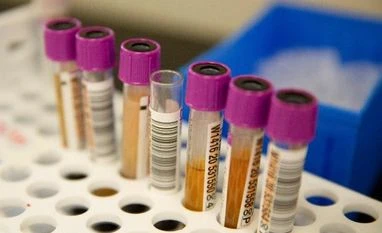The UK will go through the "most dangerous time" as it enters "the worst" weeks of the COVID-19 pandemic, England's Chief Medical Officer (CMO) said on Monday as he urged the public to strictly follow the stay-at-home lockdown to help curb the transmission of infections.
Professor Chris Whitty, who is also the face of a series of awareness campaigns about following lockdown rules, said the only way to help an already overwhelmed National Health Service (NHS) is to minimise all unnecessary contact with other people while the vaccination programme is accelerated in parallel.
I think everybody accepts that this is the most dangerous time we've really had in terms of numbers into the NHS. The next few weeks will be the worst of the pandemic for the NHS,'' Prof Whitty told the BBC.
"This is everybody's problem. Any single unnecessary contact you have with someone is a potential link in a chain of transmission that will lead to a vulnerable person," he said.
He said there were over 30,000 people in England hospitals with COVID-19, compared to about 18,000 at the peak last April. He added that "anybody who is not shocked" by the number of people in the hospital "has not understood this at all".
"This is an appalling situation," he said, pointing to the more than 80,000 coronavirus deaths since the start of the pandemic and an estimated one in 50 people infected in the UK.
His latest warning comes as the UK's new mass vaccination centres opened their doors to vulnerable categories, with eligible over-80 individuals being informed by letters from the NHS.
Also Read
The centres are an additional option for people, who can book an appointment at one of the seven centres through the national booking service online or over the phone.
If it is not convenient for them, they can instead be jabbed at one of their local vaccination centres in the coming weeks.
Increasing supplies means the NHS can open even more vaccination services and protect even more people this week, said Professor Stephen Powis, the NHS' national medical director.
And whether you have had a vaccine or not, please continue to follow all the guidance to control the virus and save lives that means staying at home as much as you can, he said.
As well as offering additional options for the over-80s, the NHS Vaccine Centres will also help in the NHS's drive to protect its frontline staff as well as social care workers providing vital support in communities.
The initial sites were chosen from those ready to vaccinate large numbers of people quickly to give a geographical spread covering as many people as possible, the NHS said.
Invites to book at the centres are being sent to people aged 80 or over who have not yet been vaccinated and live up to 30 to 45 minutes' drive from one of the seven new sites.
The letters explain how they can book a slot over the phone or online through the national booking service, and NHS leaders are urging people not to turn up at the centres or try to book without receiving them.
The new vaccine centres will each be capable of delivering thousands of vaccinations each week, scaling their operations up and down according to vaccine supplies and demand.
According to the NHS, there are already nearly 1,000 vaccination sites across the country, using the Pfizer/BioNTech and Oxford/Astrazeneca jabs. A third vaccine, the Moderna jabs, is likely to join the programme by March once supplies start rolling in. All three vaccines require two shots, to be administered 12 weeks apart.
The government has set a goal to vaccinate around 15 million people in the UK the over-70s, healthcare workers and those required to shield due to underlying health conditions by mid-February.
(Only the headline and picture of this report may have been reworked by the Business Standard staff; the rest of the content is auto-generated from a syndicated feed.)
)